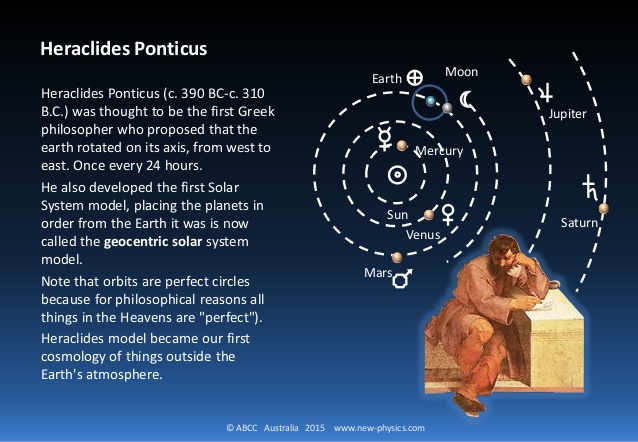Heraclides Ponticus
The Greek philosopher Heraclides of Pontus (ca. 388 B.C.-310 B.C.) proposed the theory that the apparent daily revolution of the fixed stars is in fact due to the actual daily rotation of the earth about its own axis.
Some think that the earth remains at rest. But Philolaus the Pythagorean believes that, like the sun and moon, it revolves around the fire in an oblique circle. Heraclides of Pontus and Ecphantus the Pythagorean make the earth move, not in a progressive motion, but like a wheel in rotation from west to east around its own center. Plutarch, Moralia, ca. 100 AD.
Heraclides Ponticus (387 - 312 BC), also known as Heraklides, was a Greek philosopher who lived and died at Heraclea, now Eregli, Turkey. He has frequently been hailed as the originator of the heliocentric theory. Though this is now generally doubted, he did anticipate the thinking of later astronomers.
Heraclides' father was Euthyphron, a wealthy nobleman who sent him to study at the Academy in Athens under its founder Plato and under his successor Speusippus, though he also studied with Aristotle. According to the Suda, Plato, on his departure for Sicily in 360 BC, left his pupils in the charge of Heraclides. Speusippus, before his death in 339 BC, had chosen Xenocrates as his successor but Xenocrates narrowly triumphed in an ensuing election against Heraclides and Menedemus.
Many stories abound that suggest he may have been a rather vain and pompous man and the target of much ridicule. However, Heraclides seems to have been a versatile and prolific writer on philosophy, mathematics, music, grammar, physics, history and rhetoric, notwithstanding doubts about attribution of many of the works.
His major distinction is that he realised, as the result of observation, that Venus and Mercury orbit the Sun as satellites. Some writers have seen this as evidence that he originated the heliocentric theory prior to Aristarchus of Samos and Nicolaus Copernicus.This would mean that he anticipated the Tychonic system, an essentially geocentric model with heliocentric aspects. However, the tradition is almost certainly due to a misunderstanding, and it is unlikely that Heraclides, or his Pythagorean predecessors, advocated a variation on the Tychonic system.
Of particular significance to historians is his statement that fourth century Rome was a Greek city...
References
O. Neugebauer, (1969) The Exact Sciences in Antiquity
O. Neugebauer (1975) A History of Ancient Mathematical Astronomy
O. Voss (1896) De Heraclidis Pontici vitaet scriptis
Diogenes Laërtius trans. C.D. Yonge (1853) "Lives of Eminent Philosophers"
Bruce Eastwood, "Heraclides and Heliocentrism: Texts, Diagrams, and Interpretations." Journal for the History of Astronomy 23 (1992): 233-60.
[1]













